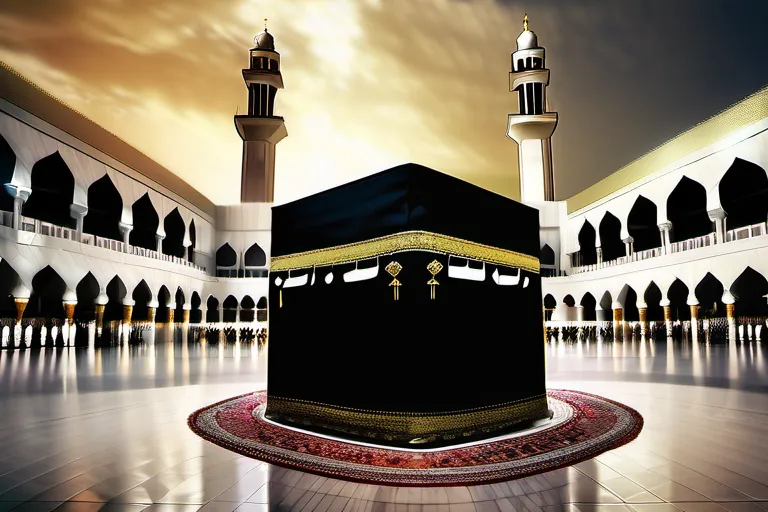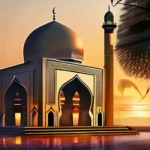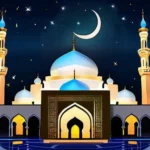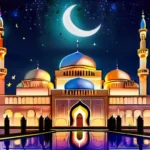Explore the religious, historical, and cultural importance of Mecca in Islamic beliefs.
Delve into the profound significance of Mecca, the holiest city in Islam. From its rich history to its spiritual relevance, this article will uncover the essence of this sacred destination.
The History of Mecca: A Journey Through Time
The origins of Mecca, the birthplace of Islam and the holiest city in the Muslim world, are as ancient as the legends that weave through its history. Imagine a place where time seems to slow down, where every stone whispers tales of faith and devotion. Could it be that this city’s roots stretch back centuries, even millennia, to a time when it was merely a small trading post nestled between vast deserts?
According to Islamic tradition, Mecca was founded by Ibrahim, or Abraham in Western texts, along with his son Ismail. They were said to have built the House of Allah (Kaaba), which has stood as a symbol of unity and pilgrimage for believers across generations. Could it be that this structure, now a cornerstone of Islamic worship, was originally constructed as a sanctuary from the chaos of idolatry?
The city’s significance grew over time, especially after the rise of Prophet Muhammad in the 7th century CE. He reformed many traditions and practices associated with Mecca, turning it into a focal point for the new religion of Islam. Could you imagine the transformation that took place as Mecca became the heart of the Muslim world, its streets filling with pilgrims seeking spiritual renewal?
From being a humble trading hub to becoming a global center of faith, the journey of Mecca is nothing short of miraculous. It has seen the rise and fall of empires, witnessed wars and peacemaking, and stood as a beacon of hope for millions. Could you fathom the impact that such a city has had on the history of Islam?
The Kaaba: The Heart of Mecca
The Kaaba, standing like a beacon in the heart of Mecca, is more than just a building; it’s a symbol that transcends time and space. Imagine if every stone had a story to tell, each one whispering tales of prophets and pilgrims. The Kaaba, with its simple yet profound design, serves as a focal point for the unity of Muslims worldwide. How does such a small structure hold such immense spiritual significance?
The Kaaba’s history is intertwined with that of Mecca itself. It was originally built by Prophet Abraham and his son Ishmael, according to Islamic belief, as a house of worship for one God. Over centuries, it has been rebuilt and restored, but its core purpose remains unchanged. The Qibla, the direction Muslims face during prayer, is oriented towards this sacred site. Why would such a central figure in prayer be directed toward something so small? Is it merely a physical landmark or does it carry deeper spiritual symbolism?
The Kaaba is also the focal point for the circumambulation, or tawaf, performed by pilgrims during Hajj. This ritual of walking around the Kaaba seven times is not just a physical act but a profound expression of submission and devotion to Allah. How can such a simple action evoke feelings so deep that they connect people from all corners of the globe?
Moreover, the Black Stone, embedded in one corner of the Kaaba, adds another layer of mystique. Legends speak of its miraculous properties and the protective energy it exudes. Is this stone simply a historical artifact or does it hold cosmic significance? The Kaaba’s inner sanctum houses the Hikmah (wisdom) and Furqan (distinguisher), believed to be remnants of divine revelation. What secrets might these treasures hold, waiting to be uncovered?
In essence, the Kaaba is a living testament to the unifying power of faith. It stands as a constant reminder that despite our differences, we are united in our quest for the truth and our devotion to Allah. The Kaaba’s significance lies not just in its history but in the experiences it catalyzes – moments of reflection, renewal, and connection with the divine. How can you relate to this sacred space? Can you imagine placing your hand on that stone, feeling the weight of centuries of worship and faith?
Hajj: The Pilgrimage to Mecca
Imagine standing at the edge of a bustling city, where every year millions of souls converge to fulfill one of the Five Pillars of Islam: the Hajj pilgrimage to Mecca. This sacred journey is not just a religious ritual but a profound spiritual odyssey that connects pilgrims from across the globe to the very heart of Islamic history and faith.
Why do Muslims travel so far to stand on the plains of Mina, walk between the hills of Safa and Marwah, and circle the Kaaba? What makes this journey more than just a physical pilgrimage?
The answer lies in the deep-rooted history and cultural significance of Mecca. As you step into the city, the air is thick with tradition and reverence. The Qibla, which guides every Muslim’s direction during prayer, points towards this very city. It’s as if the entire city stands as a living testament to the journey of Prophet Muhammad (PBUH) and his followers.
The rituals of Hajj are intricate and meaningful, each step echoing with centuries of devotion and reflection. From throwing stones at the Safa and Marwah hills to circling the Kaaba seven times, every act carries a story and a lesson. It’s as if time itself has been frozen in this moment, allowing each pilgrim to step back into history and forge an unbreakable bond with the divine.
Through these rituals, pilgrims are not just visitors; they become part of a timeless narrative. They walk where prophets once walked, they stand where miracles occurred, and they experience the profound unity that comes from sharing this journey together. It’s a chance to cleanse oneself spiritually, to reaffirm faith, and to connect with a community that spans continents and centuries.
Mecca in Islamic Doctrine
In the heart of Saudi Arabia lies the sacred city of Mecca, a place that holds a unique and profound significance in Islamic doctrine. Is it any wonder then why the Quran refers to Mecca as the ‘mother of cities’? This title is not just a geographical acknowledgment but a reflection of its central role in the spiritual lives of Muslims worldwide.
The Holy City is mentioned extensively in the Quran, most notably in Surah Al-Isra, where Allah says: ‘Truly it is an announcement to you and to your people, and you will be brought back (to Mecca) as a manifest victor.’ (Verse 187). This verse encapsulates the city’s pivotal role in both historical and spiritual terms. It’s almost as if Mecca is woven into the very fabric of Islamic belief, serving as a beacon for pilgrims from across the globe.
But what about Hadiths? How do they speak to the significance of Mecca? The sayings of Prophet Muhammad (PBUH) emphasize Mecca’s sanctity. He is reported to have said: ‘Mecca will remain victorious until the Day of Judgment,’ highlighting its eternal importance. These traditions not only reinforce the city’s religious stature but also underscore its resilience against time and change.
Moreover, the Fatawa (legal opinions) and scholarly interpretations further solidify Mecca’s central place in Islamic thought. For instance, many scholars believe that visiting Mecca is obligatory for every able-bodied adult Muslim at least once in their lifetime, known as Hajj. This commandment underscores the city’s indispensable role in fulfilling one’s faith.
Through these texts and traditions, we see how deeply embedded Mecca is within the Islamic framework. It’s more than just a place; it’s a living testament to the core tenets of Islam—worship, community, and submission to the will of Allah. Understanding its significance isn’t merely academic—it’s an essential part of every Muslim’s spiritual journey.
The Cultural Significance of Mecca
How does one even begin to understand the profound influence of Mecca on Islamic art and architecture? It’s like trying to grasp the essence of a towering mountain – both awe-inspiring and deeply rooted in every aspect of life. Mecca, with its sacred Kaaba at the heart, has been more than just a city; it’s the heartbeat of Islam, pulsating with history and spirituality.
Imagine standing before the Grand Mosque, the largest in the world, and contemplating the sheer scale of Islamic art. Each piece, from intricate calligraphy to elaborate mosaics, tells a story. These aren’t just decorative elements; they are threads woven into the very fabric of Islamic culture, reflecting the devotion and creativity of generations. The architecture here is not just about grandeur but about symbolism. Every minaret, every dome, every wall bears witness to the faithful’s journey towards Tawhid, the unity of God.
The cultural identity of Muslims around the globe is inextricably linked with Mecca. The city’s influence extends far beyond its physical borders. From the intricate patterns adorning prayer rugs across diverse cultures, to the designs etched into the walls of mosques from London to Jakarta, each piece bears a connection back to this holy site. These artistic expressions are not merely aesthetic; they are living testaments to the enduring legacy of Mecca.
Moreover, the architecture of Mecca is a testament to the unity and diversity of Islam. The Grand Mosque, with its ability to accommodate millions of pilgrims during Hajj, symbolizes the inclusive nature of Islam. It’s a place where people from all walks of life, speaking different languages, come together in harmony, united by their faith.
So, as we marvel at the beauty and complexity of Islamic art and architecture, let us remember that each piece is a reflection not just of aesthetic genius but of the profound impact of Mecca on the hearts and minds of Muslims worldwide. It’s a city where history and spirituality converge, making it more than a destination – it’s a journey.
The Modern City of Mecca: A Global Center for Islam
The Sacred City of Mecca: Understanding Its Significance in Islam
Imagine a place where time seems to slow, where the bustling modernity of the world outside fades away into the timeless echo of La ilaha illallah, the declaration of faith that reverberates through the air. This is Mecca, not just a city but a holy sanctuary at the heart of Islamic belief and practice.
Mecca’s significance in Islam cannot be overstated; it’s more than a destination for pilgrims—it’s a symbol of spiritual rebirth. As one wanders through its streets, one can almost feel history unfolding before their eyes. But what has transformed this once-sleepy town into the bustling metropolis it is today?
Over the centuries, Mecca has evolved from a simple pilgrimage site to a global center for Islam. The influx of millions of pilgrims each year has brought about a remarkable transformation, with new infrastructure and services catering to the needs of the faithful.
- Hajj facilitation: From the construction of grand mosques like Masjid Al-Haram to the expansion of roads and airports, every effort is made to ensure that the journey of Hajj is as seamless as possible. These improvements reflect a deep commitment to upholding the sanctity of the city.
- Cultural hub: The city now hosts numerous cultural events and exhibitions, making it a vibrant melting pot of Islamic art, literature, and scholarship. This blend of ancient traditions with modern innovation keeps Mecca alive and relevant in today’s globalized world.
Yet, amidst all this change, the essence of Mecca remains unchanged. The city continues to fulfill its role as a spiritual cornerstone for Muslims worldwide, offering a place where all believers can come together under one roof to reaffirm their faith and seek guidance from the divine.
How does such a transformation occur without losing sight of tradition? How is it possible that this bustling city still retains its sacred integrity? The answers lie in the careful balance between modernity and piety, innovation and reverence. Mecca stands as a testament to the enduring power of faith in shaping human destiny.
As you stand amidst the crowds during Hajj season, marveling at the sheer scale of this spiritual endeavor, ponder: What is your own pilgrimage about? Is it not also a journey towards self-improvement and spiritual awakening?
In Mecca, every step, every prayer, and every moment serves as a reminder of the universal call to seek Allah’s pleasure. This sacred city remains a beacon of hope and inspiration for all those seeking guidance in their faith.
Conclusion
 In conclusion, Mecca embodies the heart and soul of Islam, serving as a beacon for millions of Muslims around the world. Its importance transcends time and space, providing a unique connection between believers and their faith.
In conclusion, Mecca embodies the heart and soul of Islam, serving as a beacon for millions of Muslims around the world. Its importance transcends time and space, providing a unique connection between believers and their faith.











